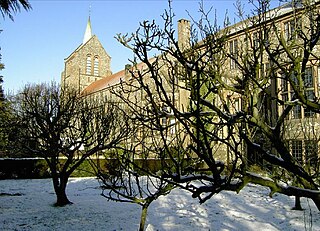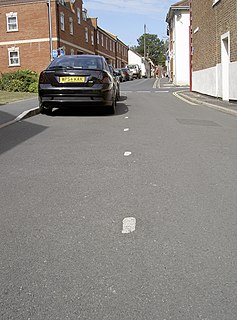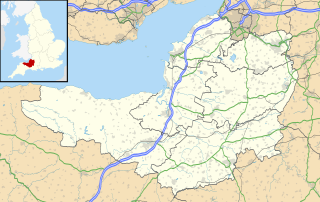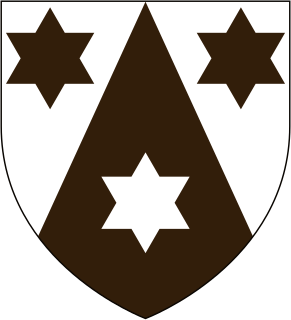
Greyfriars is a Roman Catholic friary and parish located in East Oxford, which until 2008 was also a Permanent Private Hall of the University of Oxford. Situated on the Iffley Road in East Oxford, it was one of the smallest constituent halls of the university. Its status as a Permanent Private Hall (PPH) referred to the fact that it was governed by an outside institution, rather than by its fellows as is a College.

Ilchester is a village and civil parish, situated on the River Yeo or Ivel, five miles north of Yeovil, in the English county of Somerset. Originally a Roman town, and later a market town, Ilchester has a rich medieval history and was a notable settlement in the county; around the 12th and 13th centuries it was effectively the county town. It had, however, declined in size and importance by the beginning of the 18th century, and the last markets were held in 1833. In 1889 the historic corporation that had governed the town was dissolved.

Blackfriars, Gloucester, England, founded about 1239, is one of the most complete surviving Dominican black friaries in England. Now owned by English Heritage and restored in 1960, it is currently leased to Gloucester City Council and used for weddings, concerts, exhibitions, guided tours, filming, educational events and private hires. The former church, since converted into a house, is a Grade I listed building.

Hinton Priory was a Carthusian monastery in northeast Somerset, England, from 1232 until 1539.

Bridgwater Friary was a Franciscan monastery in Bridgwater, Somerset, England, established in 1245 and dissolved in 1538.

Ilchester Nunnery, in Ilchester, Somerset, England, was founded around 1217-1220 as the "White Hall Hospital of the Holy Trinity", after the gift of a house and other property by William "The Dane" of Sock Dennis manor, Ilchester. From this family was probably descended the influential Denys family of Devon, seated at Orleigh in the 16th century. By 1281, it had been converted into an Augustinian nunnery.

Ilchester Museum is a small local museum in Ilchester, Somerset, England.

Blackfriars, Bristol was a Dominican priory in Broadmead, Bristol, England. It was founded by Maurice de Gaunt in 1227 or 1228. Llywelyn ap Dafydd, son of Dafydd ap Gruffydd, the last native Prince of Wales, was buried in the cemetery of the priory. Following the Dissolution of the Monasteries in the 16th century, surviving parts of the priory became a guildhall for the Smiths and Cutlers Company, the Bakers Company, a workhouse and then a meeting house for the Quakers. In the 20th century, it has housed the local Register_office_(United_Kingdom), a theatre company, and a restaurant.

Greyfriars, in Bristol, England, was a Franciscan friary. The name Greyfriars derived from the grey robes worn by the friars. It was founded at some time before 1234, within the town walls and then moved to Lewin's Mead in 1250. The site included extensive gardens surrounded by a stone wall. Following the Dissolution of the Monasteries in the sixteenth century, the premises were leased to the town council in 1541, who desired to use the stone to make repairs to the town walls, and the harbour facilities. In succeeding centuries many different uses have been made of the site, which is currently occupied by an office block and part of Bristol Dental School.

Whitefriars was a Carmelite friary on the lower slopes of St Michael's Hill, Bristol, England. It was established in 1267; in subsequent centuries a friary church was built and extensive gardens developed. The establishment was dissolved in 1538.

Blackfriars Friary was a medieval Dominican friary dating back to the thirteenth century. The remains of the friary, located in Hereford, England, consist of monastery ruins, a cemetery, and a stone preaching cross. The ruins are surrounded by a rose garden established by the local community in 1964.

Boston Friary refers to any one of four friaries that existed in Boston, Lincolnshire, England.

Guildford Black Friary was a medieval monastic house in Surrey, England.
The Black Friary was a Dominican friary located in Trim, County Meath, Ireland.

Nottingham Whitefriars is a former Carmelite monastery located in Nottingham, England.

Petherton Park was a Deer park around North Petherton within the English county of Somerset.

Pill Bridge is a stone arch bridge over the River Yeo between the parishes of Ilchester and Long Sutton, in the English county of Somerset. It is a scheduled monument.

The Anglican Church of St Mary Major in Ilchester, Somerset, England was built in the 13th century. It is a Grade II* listed building.
















